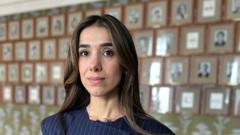In a powerful courtroom scene in Munich, a survivor of the Islamic State (IS) oppression, known as Nora, confronted the perpetrators of unimaginable horrors. In 2015, Nora and her five-year-old daughter Reda were held captive by the jihadist group in Iraq, experiencing brutal violence emblematic of IS's genocidal campaign against the Yazidi people, endorsed by the United Nations. Taha al-Jumailly, the man responsible for Reda's death following extreme punishment for a minor offense, was convicted of genocide, aided by courageous testimonies from survivors like Nora.
These judicial victories, enlightened by the tenacious campaigning of Nobel Peace Prize winner Nadia Murad, highlight significant legal triumphs against IS. Murad emphasized that showing accountability can deter future atrocities, as she pointed out the fear IS has in facing women like herself in court. “What people don’t know about [IS] is that they don't care about being killed, but they fear facing women and girls in court,” she remarked, advocating for concerted global efforts in pursuing such justice.
Since IS's rise in northern Iraq in 2014, the group has claimed thousands of Yazidi lives, deliberately targeting the community for its religious beliefs. Despite international attention and efforts, only a small number of IS members have faced legal consequences for war crimes. The investigations facilitated by the UN’s Unitad, which Murad tirelessly campaigned to establish, resulted in the accumulation of extensive evidence. Sadly, progress was stymied in September when Iraq declined to continue its collaboration with the UN, leaving a vast trove of evidence stagnant in New York.
Murad expressed profound disappointment over the lack of political will among international bodies to advance justice and accountability. "It’s devastating to survivors," she declared, reflecting on the obscure legal status of many IS detainees in Iraq who are charged under anti-terrorism laws without clarity on specific war crimes.
Survivors like Murad carry immense burdens from trauma; she lost most of her family to IS and was herself sold into slavery. Her advocacy work focuses on representing victims’ rights and countering the stigma associated with sexual violence in her homeland. She developed the "Murad Code," designed to empower survivors in sharing their stories with investigators while controlling their narrative.
The efforts to locate and identify mass graves belonging to IS victims in Iraq remain slow and fraught, with many families left uninformed about the fate of their loved ones. Recent instances arose where families learned of developments about the remains of their relatives through social media. Murad highlighted the painful truth of long waits for closure, as many of the Yazidi dead remain unidentified and unburied.
On the 10th anniversary of the Yazidi genocide, Murad criticized the inefficacy of international bodies like the UN, expressing her disillusionment with their failure to protect vulnerable communities. She asserted the need for preventive measures against repeating cycles of violence across regions like Iraq and Syria. “You can’t just defeat an ideology like [IS] with weapons,” she stressed, advocating for sustainable justice as crucial for healing.
Though Murad feels she achieved a form of justice by breaking the silence surrounding her past, she continues to advocate for those who remain unheard. The lived trauma of her community underscores a profound need for international accountability to avert future atrocities and ensure justice for all victims of violence.




















